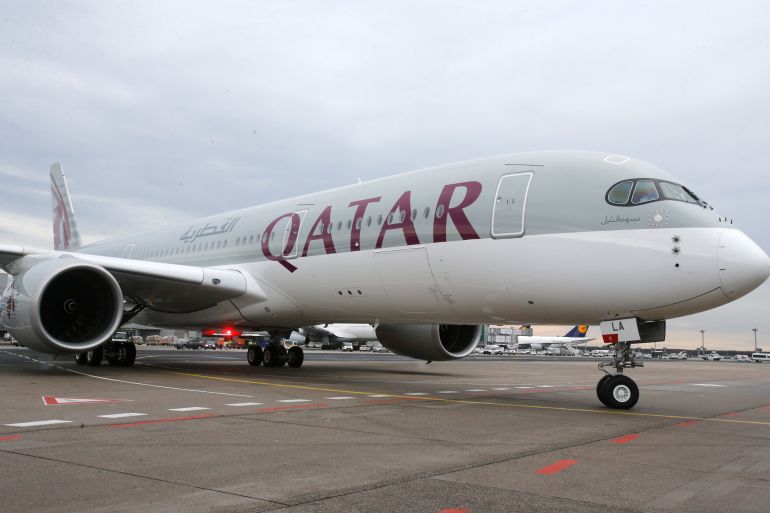Qatar Airways seeks more than $600m in Airbus A350 dispute
The two companies have been locked in a row for months over damage including blistered paint, among other issues.

Qatar Airways is claiming more than $600m in compensation from planemaker Airbus for surface flaws on A350 jetliners, according to a court document shedding new light on a growing business feud worth $4m a day.
The Gulf carrier is also asking British judges to order France-based Airbus not to attempt to deliver any more of the jets until what it describes as a design defect has been fixed.
Keep reading
list of 3 itemsFatma Samoura: The road to Qatar 2022
#FIFArabCup: Will Qatar score as host?
The two companies have been locked in a dispute for months about damage including blistered paint, cracked window frames or riveted areas and erosion of a layer of lightning protection.
Qatar Airways said its national regulator has ordered it to stop flying 21 out of its 53 A350 jets as the problems appeared, prompting a bitter dispute with Airbus which has said that, while it acknowledges technical problems, there is no safety issue.
Now, the financial and technical details associated with the rare legal spat have emerged in a court filing at a High Court division in London, where Qatar Airways sued Airbus in December.
The Gulf airline is calling for $618m in compensation from Airbus for the partial grounding, plus $4m for every day that the 21 jets remain out of service.
The claim includes $76m for one aircraft alone – a five-year-old A350 that was due to be re-painted in livery for the 2022 World Cup, which Qatar is hosting later this year.
That aircraft has been parked in France for a year, needing 980 repair patches after the aborted paint job exposed gaps in the lightning shield, industry sources said.
The largest customer for Europe’s premier long-haul jet claims Airbus failed to provide a full root-cause analysis needed to satisfy unresolved questions over the airworthiness of the affected jets including the lightning protection system.
The jets feature a layer of copper mesh under the paint to prevent lightning – which strikes planes on average once a year – damaging the carbon-composite fuselage, which is lighter but less conductive than traditional metal.
Breakdown of relations
Airbus said it understood the cause and would “deny in total” the airline’s complaint. It has accused the airline, once one of its most highly courted customers, of trying to mischaracterise the problems as a safety concern.
“Airbus restates there is no airworthiness issue,” a spokesperson said, adding this had been confirmed by European regulators.
Qatar Airways, which has ordered a total of 80 A350s, had no immediate comment.
The airline has long had a reputation as a demanding buyer, sporadically rejecting deliveries for quality reasons.
But the 30-page complaint detailed an unusual collapse of relations between two of aviation’s most powerful players.
The row widened in November when a Reuters investigation revealed at least five other airlines had discovered surface flaws, prompting Airbus to set up an internal task force and to explore a new anti-lightning design for future A350 planes.
Qatar is so far the only country to ground some of the jets.
Under aviation rules, the manufacturer’s primary regulator – in this case the European Union Aviation Safety Agency (EASA) – has responsibility for overseeing an aircraft’s design.
Regulators in each country when the plane is operated are responsible for each individual aircraft.
The complaint detailed how the Qatar Civil Aviation Authority (QCAA) had started withdrawing flying permits for individual A350 planes in a series of letters from June 2021.
It said the QCAA had told Airbus that the deterioration of aeroplanes was “disturbing, if not alarming”.
It is the first public evidence of the stance of Qatar’s regulator, which has not so far commented in public.
Airbus has appeared to question the QCAA’s independence from the state-owned airline, saying the decision to drag safety into a technical matter put at risk global safety protocols.
Qatar Airways Chief Executive Akbar Al Baker said in London in November that Qatar’s regulator was in charge of decisions and that the dispute had caused a “serious dent” in operations.
The airline has started bringing mothballed A380s out of retirement as it prepares to cope with the football World Cup.